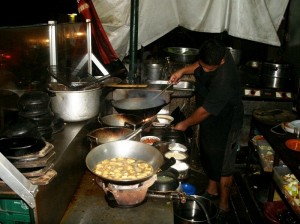
Answer: There are so many marks of true entrepreneurs that we might just as well call them supermen and superwomen. But some marks do stand out. And in citing a few, I would like to refer to Fred (not his real name), an amazing entrepreneur.
You see, as I drive home, I go past this giant hardware store that is so complete that you need not go anywhere else to buy materials for building a house. Long before that hardware was set up, Fred was already operating a small eatery with goat meat as its specialty, with just two small dining tables in a nipa hut on rented land just beside the future site of the hardware.
When the hardware store opened, a small chandelier shop also opened opposite Fred’s eatery. Now guess which business survived, the chandelier shop or Fred’s eatery?
Fred’s eatery lasted longer of course because the giant hardware store was not a competitor. On the other hand, the giant hardware store was already selling chandeliers. So why would its customers still step out to buy chandeliers next door?
For that matter, why would anyone buy chandeliers from the small shop when they can buy the same from a bigger one that will probably have all the necessary electrical accessories to go with a chandelier? Needless to say, the chandelier shop closed just a few months after it opened.
Being in business is packed with risks, but true entrepreneurs know that business risk can be minimized by applying the right positioning strategy. Fred was not competing with the hardware store. On the contrary, the hardware’s employees became his captured market. And while his strip of sidewalk was already known for selling newly slaughtered goats, Fred was the only one then selling cooked goat meat.
In no time at all, it was not unusual to see jeeps and even long buses diagonally parked in front of Fred’s eatery (and causing heavy traffic on a major thoroughfare).
True entrepreneurs have a clear vision of their business.
Fred also knew from his heart that to be a successful entrepreneur he would have to short-circuit Maslow.
If you have not come across Abraham Maslow’s work yet, he developed the hierarchy of needs theory in psychology in his 1943 paper titled “A Theory of Human Motivation.”
While this theory is commonly depicted in a pyramid, it is said that Maslow himself did not use a pyramid to describe his theory.
Maslow said that people start with the basic survival needs. Once these are satisfied, they move up to safety needs, then belonging needs, then self-esteem needs and finally self-actualization needs.
The first four groups of needs are the deficiency or d-needs while the last set is the being or b-needs. While humans will probably be driven by many types of needs at the same time, Maslow said that generally lower level needs must be met first before people feel the motivation to meet the next higher level of needs.
But Maslow also coined a term for people who “skip” the d-needs and move on straight to the b-need. He called this metamotivation. To be metamotivated is to short-circuit Malsow’s hierarchy of needs.
Fred is a metamotivated person. When he was still an employee, he realized that he can also be a successful business owner. So he struck out on his own, taking with him just a few pesos in capital but a broad set of skills in cooking. He focused on making sure he was the best cook he could be with his specialty, goat meat. While he knew he had to be profitable, he also considered what was affordable by his target market, which initially were the jeepney and bus drivers whose route took them in front of his eatery. This is why metamotivation can also be called passion.
True entrepreneurs are also passionate about their business.
From a small nipa hut with two tables, Fred now manages a nearly 300-square-meter restaurant with cement walls and corrugated steel roofing. Customers come from as far as 10 kilometers away and some even ask Fred to cook food for parties. Advertisers have taken notice of his success. One even gave him his free sign, complete with logo design.
The other thing that classifies Fred as metamotivated is his pride in not how much he has grown, but how many people he has given employment to and given the means to move on to higher paying jobs.
He told me that some of his former employees are now working abroad and earning the equivalent of as much as P300,000 a month.
True entrepreneurs go beyond themselves and their business.
If you want to know more about the marks of a true entrepreneur as well as effective personal cash, debt, risk and wealth management, attend the EnRich training scheduled on May 16, 2012. Visit www.personalfinance.ph, e-mail info@personalfinance.ph or call (632) 216-1541 for more details.
Here’s to the potential entrepreneur in all of us.
(Efren Ll. Cruz is a registered financial planner of RFP Philippines, personal finance coach, investment adviser and best-selling author. Questions about the article may be sent by SMS to 0917-505-0709 or e-mailed to efren@personalfinance.ph. To learn more about the RFP program, visit www.rfp.ph or e-mail info@rfp.ph.)
Copyright 2012 INQUIRER.net and content partners. All rights reserved. This material may not be published, broadcast, rewritten or redistributed.

